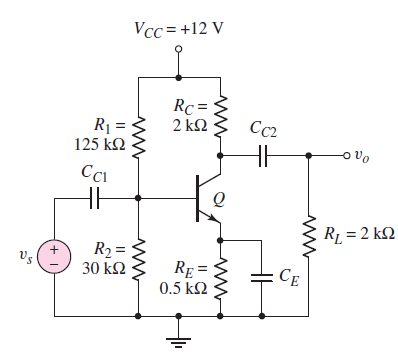Given the following circuit with \$\beta=80\$, \$V_{BE(on)}=0.7V\$, \$V_A=\infty\$, for an input signal \$V_s=18cos(\omega t) mV\$, I would like to calculate the power dissipated in the transistor.
I began by calculating the thevenin equivalent voltage and resistance in order to solve for the base current as follows:
\$R_{thev} = \frac{R_1 R_2}{R_1+R_2} = \frac{30k\Omega \times 125k\Omega}{30k\Omega + 125k\Omega} = 24.194k\Omega\$
\$V_{thev} = V_{cc} \frac{R_2}{R_1+R_2} = 2.32V\$
The base current can be solved for by writing a KVL equation around the base-emitter loop and substituting \$I_e=(\beta+1)I_b\$:
\$-V_{thev} + R_{thev}I_b + V_{BE(on)} + R_eIe = 0\$
\$-V_{thev} + R_{thev}I_b + V_{BE(on)} + R_eIb(1+\beta) = 0\$
and solving for \$I_b\$:
\$I_b = \frac{V_{thev}-V_{BE(on)}}{R_{thev} + (1+\beta)R_e} = 25.1\mu A\$
Then \$I_c = \beta I_b = (80)(2.006 \mu A) = 2.01mA \$
The collector-emitter voltage can be solved for by writing the equation around the collector emitter loop:
\$V_{CE} = V_{cc} - R_c I_c - R_e I_e = 6.973 V\$
The power dissipated in the transistor is given by
\$PQ = I_{CQ}V_{CEQ}-\frac{1}{2}I^2_cR_c\$
And presumably, the power dissipated in the load is given by
\$PL = \frac{1}{2}I^2_cR_L\$
First I will need to solve \$I_c\$
I write te expression as:
\$I_c = \beta(\frac{R_{thev}}{R_{thev} + R_{ib}})(\frac{V_s}{R_{is}})\$
In the expression above \$R_{ib}\$ is the internal resistance of the transistor in the small signal model given by:
\$R_{ib} = r_\pi + (1+\beta)R_e\$ with \$r_\pi = \frac{V_T}{I_b}\$
\$R_{is} = Rs + R_i\$ (in this case no source resistance was indicated so it is just \$R_i\$)
And \$R_i = R_{thev}||R_{ib}\$
Therefore substituting the above expressions into \$I_c\$
\$I_c = \beta(\frac{R_{thev}}{R_{thev} + r_\pi + (1+\beta)R_e })(\frac{V_s}{R_{thev}||R_{ib}})\$
\$ = (80)(\frac{24194}{24194+40513})(\frac{V_s}{15148}) = 1.974\times 10^{-3} V_s\$
From this I calculate the power dissipated in the transistor to be
\$PQ = I_{CQ}V_{CEQ}-\frac{1}{2}I^2_cR_c = (2.01mA)(6.973V) - 0.5(1.974\times 10^{-3} \times 0.018)^2(2000) = 13.98mW\$
However the textbook answer gives \$13.0mW\$ rather. Where am I going wrong?

